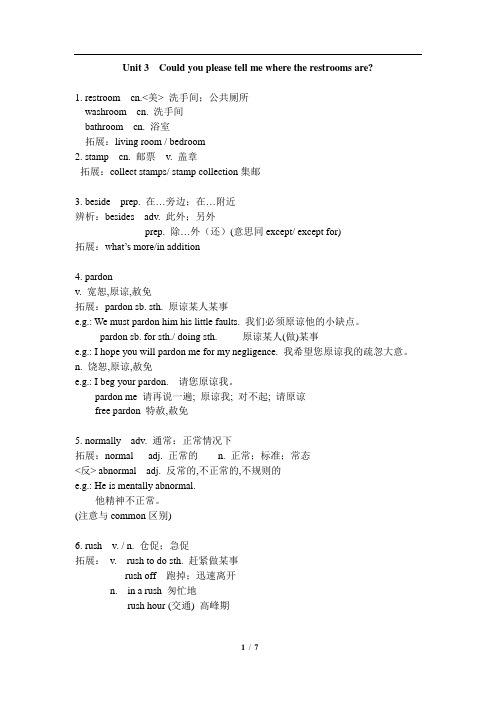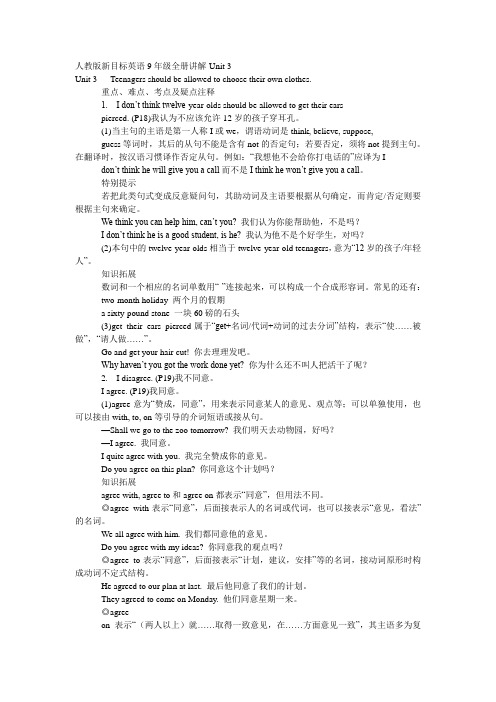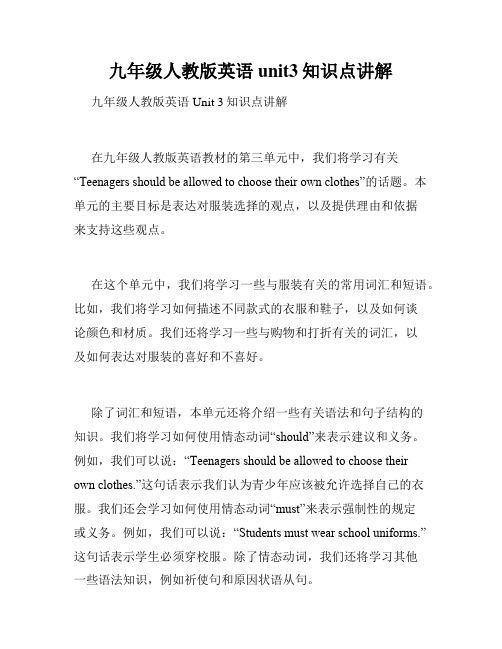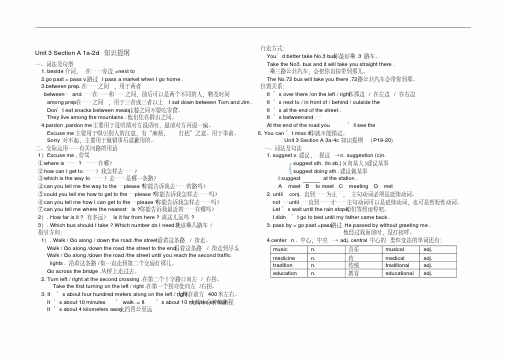2017年人教版初中英语九年级英语课文知识点同步精讲unit3
人教版英语九年级词汇精讲-Unit3

Unit 3 Could you please tell me where the restrooms are?1. restroom cn.<美> 洗手间;公共厕所washroom cn. 洗手间bathroom cn. 浴室拓展:living room / bedroom2. stamp cn. 邮票v. 盖章拓展:collect stamps/ stamp collection集邮3. beside prep. 在…旁边;在…附近辨析:besides adv. 此外;另外prep. 除…外(还)(意思同except/ except for)拓展:what’s more/in addition4. pardonv. 宽恕,原谅,赦免拓展:pardon sb. sth. 原谅某人某事e.g.: We must pardon him his little faults. 我们必须原谅他的小缺点。
pardon sb. for sth./ doing sth. 原谅某人(做)某事e.g.: I hope you will pardon me for my negligence. 我希望您原谅我的疏忽大意。
n. 饶恕,原谅,赦免e.g.: I beg your pardon. 请您原谅我。
pardon me 请再说一遍; 原谅我; 对不起; 请原谅free pardon 特赦,赦免5. normally adv. 通常:正常情况下拓展:normal adj. 正常的n. 正常;标准;常态<反> abnormal adj. 反常的,不正常的,不规则的e.g.: He is mentally abnormal.他精神不正常。
(注意与common区别)6. rush v. / n. 仓促;急促拓展:v. rush to do sth. 赶紧做某事rush off 跑掉;迅速离开n.in a rush 匆忙地rush hour (交通) 高峰期7. suggest v. 建议;提议suggest doing sth. 建议做某事suggest that sb. (should) do sth. 拓展:suggestion cn. 建议<辨析> advice un. 建议拓展:v. adviseadvise sb. to do sth. 建议某人做某事sb. be advised(asked\encouraged…) to do sth.8. pass v. 给;递;走过;通过pass the exam / fail the exam 通过考试/考试不及格pass sb. sth. pass sth. to sb. 给某人递某物拓展:pass 相关短语9. grape n. 葡萄;葡萄酒;葡萄树;葡萄色拓展:wine 葡萄酒grape juice 葡萄汁10. central adj. 中心的;中央的拓展:central park 中央公园(位于美国纽约)center n. 中心;中央;中心点shopping center11. mail n.邮件;信件v.邮寄;发电子邮件mail to sb. 给某人发邮件拓展:e-mail 电子邮件mailbox 邮箱;邮筒mailman 邮差;邮递员(同postman)12. east n. 东;东方in the east of 在…的东面adj. 东方的;东部的adv. 向东;朝东拓展:eastern adj. 东方的;朝东的(每个单词后均可+ern,同前)northwest east13. fascinating adj. 迷人的;极有吸引力的拓展:fascinated adj. 迷人的;极有吸引力的fascinate v. 使…着迷worry worry sb.worry aboutbe worried about14. inexpensive adj. 不昂贵的(= cheap)拓展:inexpensively adv. 廉价地;不贵地(= cheaply)<反>expensive adj. 昂贵的(= dear)expensively adv. 昂贵地注意:比较级最高级相关:expense v. 向…收取费用n. 损失;代价;消费;开支high/low price15. uncrowded adj. 不拥挤的;人少的拓展:<反> crowded adj. 拥挤的be crowded with 挤满crowd n. 人群;观众相关短语: a crowd of 一群…;一堆…follow the crowd / go with the crowd 随大流,从众in crowds 成群,大群地crowd in upon / crowd in on 蜂拥而来<反> crowded--empty16. convenient adj. 便利的;方便的拓展:conveniently adv. 便利地convenience n. 便利常用句型:It +be +convenient +(for sb.) + to do sth.短语:be convenient for/ to 对…来说是方便的/近便的at one’s convenience 在某人方便的时候for convenience 方便起见convenience store 便利店<反> inconvenient adj. 不便的inconveniently adv. 不便地t-ce(adj.---n.)patient/important/confident/silent/independent/absent/different/ intelligent 17. mall n. 商场;购物中心拓展:shopping mall 购物中心shopping center 购物中心18. corner n. 拐角;角落拓展:the corner of 在…的拐角处on/ at the corner 在拐角处in the corner 在角落里English corner 英语角around the corner 即将发生19. politely adv. 礼貌地;客气地拓展:polite adj. 礼貌的;客气的politeness n. 有礼貌;优雅<反> impolite adj. 不礼貌的impolitely adv. 不礼貌地impoliteness n. 无礼;粗鲁拓展:注意:阅读填词中:in a polite/proper/quick/rapid/direct… way=politely/properly/quickly/rapidly/directly…20. request n. / v. 要求;请求拓展:request for …方面的请求request sth. (from) sb. (向某人)请求某事/某物request sb. to do sth. 请求某人做某事request + that 从句at the request of 根据…的请求request from 向…请求相关:require v. 要求requirement cn. 要求require sb. to do sth.21. direction n. 方向;方位拓展:direct adj. 直接的v.管理;指挥directly adv. 直接地director n. 导演;主任;主管a sense of direction 方向感22. correct adj. 正确的;恰当的v.改正;修正拓展:correctly adv. 正确地;恰当地correction n. 修正;修改correctness n. 正确性<反> incorrect adj. 不正确的;错误的incorrectly adv. 不正确地;错误地incorrectness n. 错误23.speaker n. 讲(某种语言)的人;发言者; 扬声器spoke/spoken拓展:speak v. 说话;演讲;表明speak English 说英语speak out 说出;畅所欲言speak up 更大声地说speak of 谈到;论及(同:when it comes to)speak highly of 高度评价(有时用于被动)spoken English/ English-speaking country<辨析> talk tell say speaktalk: talk to/with 和…说talk about 谈论talk to/with sb. about sth. 和某人谈论某事tell: tell sb. sth= tell sth. to sb. 告诉某人某事tell sb. (not) to do sth. 告诉某人(不要)做某事tell a story/stories 讲故事story-telling club 讲故事的俱乐部say: (强调说的内容)say hello to sb.24. address n. 住址;地址;通讯处v. 演说拓展:address book 通讯薄25. underground adj. 地下的n. 地铁(= subway)拓展:background n. 背景playground n. 操场26. parking lot (=parking area )拓展:No parking. 禁止停车parking fee/ charge 停车费parking ticket 违规停车罚单parking space 停车位。
人教版九年级英语unit3知识点,单词讲解

人教版新目标英语9年级全册讲解-Unit 3Unit 3 Teenagers should be allowed to choose their own clothes.重点、难点、考点及疑点注释1. I don’t think twelve-year-olds should be allowed to get their earspierced. (P18)我认为不应该允许12岁的孩子穿耳孔。
(1)当主句的主语是第一人称I或we,谓语动词是think, believe, suppose,guess等词时,其后的从句不能是含有not的否定句;若要否定,须将not提到主句。
在翻译时,按汉语习惯译作否定从句。
例如:“我想他不会给你打电话的”应译为I don’t think he will give you a call而不是I think he won’t give you a call。
特别提示若把此类句式变成反意疑问句,其助动词及主语要根据从句确定,而肯定/否定则要根据主句来确定。
We think you can help him, can’t you? 我们认为你能帮助他,不是吗?I don’t think he is a good student, is he? 我认为他不是个好学生,对吗?(2)本句中的twelve-year-olds相当于twelve-year-old teenagers,意为“12岁的孩子/年轻人”。
知识拓展数词和一个相应的名词单数用“-”连接起来,可以构成一个合成形容词。
常见的还有:two-month holiday 两个月的假期a sixty-pound stone 一块60磅的石头(3)get their ears pierced属于“get+名词/代词+动词的过去分词”结构,表示“使……被做”,“请人做……”。
Go and get your hair cut! 你去理理发吧。
Unit3+重点知识讲义 人教版英语九年级全册

Unit 3 知识点详解Section A一、Could you please…?(1) Could you please…?意为“请你……好吗?”,是有礼貌地提出请求的交际用语,please后接_________。
could此处表示委婉的语气,并不是can的过去式。
(2) “Could you please…?”句型的常用答语:肯定回答:Sure. /Of course. / Certainly. / No problem. /With pleasure, ...否定回答:Sorry, (I’m afraid) I can’t. /Sorry, I’d love/like to, but I ...对点训练1.—Helen, could you please water the flowers in my garden?—________. They are so lovely.A.That’s too badB.With pleasureC.You’re welcomeD.I’m afraid not2.—Could you please do the dishes?—________. I cut my finger and I'm trying not to get it wet.A.Yes, sureB.No problemC.Sorry, I’m afraid I can’tD.That would be fine二、until(1) 当until用于肯定句时,意为“__________”,主句的谓语动词必须是________动词,表示动作或状态一直延续到until所表示的时间为止。
(2) 当until用于否定句时,构成not... until...结构,意为“_______________”。
主句的谓语动词通常是____________动词,表示动作或状态直到until所表示的时间才发生。
2017年人教版初中英语九年级英语课文知识点同步精讲unit3

2017年人教版初中英语九年级英语课文知识点同步精讲Unit three Could you please tell me where the restrooms are? Section A知识点1. Get some information about the town.Information: 意思为,请判断是可数名词还是不可数名词。
我需要有关这台新计算机的一些信息。
I about the newcomputer.拓展:information/ news/ messageNews的意思是:是名词(可数还是不可数?)Message的意思是:是名词(可数还是不可数?)知识点2. The bookstore is on your right, beside the bank.Beside是介词,意思为:.指偶然地靠近,可表示动态也可表示静态。
安娜坐在我的旁边。
Anna sat beside me.这位老人住在湖边的一所房子里。
注意:beside不等于besides。
Besides也是介词,意为:除。
之外(还)Besides还可以做副词,意为:而且。
除了牛肉和猪肉外,妈妈还买了鸡肉。
Mom also bought some chicken besides beef and pork. --这周六要和我去打篮球吗?--这周六我没有空,而且,我也不是很喜欢打篮球。
--Do you want to play basketball with me this Saturday?--No, I am busy this Saturday. Besides, I don't like basketball very much.知识点3. There's a bookstore between the bank and the supermarket.Between 是介词,一般指:在两者之间。
Between ...and... 为固定搭配。
Unit3重点知识人教版九年级英语全册

九年级Unit3重点知识一词形词块拓展① normal adj. 正常的→ normally 正常地② suggest v. 建议→ suggestion n. 建议,提议suggest doing sth. 建议做某事give sb. suggestions 给予某人建议③ center n.中心,中央→ central adj. 中心的;中央的④fascinate v. 使....入迷→ fascinating adj.迷人的,极有吸引力的⑤expensive adj. 昂贵的→ inexpensive adj. 不昂贵的⑥crowd v.挤满n. 人群,观众→ crowded adj.拥挤的→ uncrowded adj.不拥挤的,人少的⑦convenient adj. 便利的,方便的→ convenience n. 方便,便利,适宜,省事It's convenient for sb. to do sth. 对某人来说做某事是便利的sth. is convenient to/for sb. 对某人来说做某事是便利的⑧polite adj. →impolite adj.不礼貌的,粗鲁的→ politely adv. 礼貌地,客气地sound impolite 听起来不礼貌⑨direct adj. 直接的,直率的→directly adv. 径直地;直接地→direction n. 方向,方位→director n.导演,部门负责人sense of direction 方向感⑩speak v. →spoke (过去式)→spoken (过去分词)→speaker 发言者→n.讲话,发言speech⑪who pron. 谁→ whom pron. 谁,什么人→ whose pron. 谁的二、重点短语Section A怎样到达书店how to get to the bookstore 在银行旁边beside the bank在某人的左边/右边on one’s left/ right 左拐/右拐turn left/ turn right 在.....和.....之间between.....and..... 对做某事感到兴奋be excited to do sth. 尝试乘骑项目try the rides 路过,经过pass by = go past买到一些明信片get some postcards 去二楼go to the second floor不必着急don’t need to rush 抓住某人的手hold one’s hand 以.....开始start with 饿了get hungry一个乐队 a rock band 向某人走去walk up to sb.在某人去...的路上on one’s way to.... 开始做某事start doing sth. =start to do sth. 沿着这条街down the street 一个工作人员 a staff person寄信mail a letter CD 播放器CD player附近的意大利餐厅the Italian restaurant nearby 大声喊的确管用Shouting did help.早点来找到一个位置come a little earlier to get a table沿着......走go/ walk along=go/ walk down/=go /walk up它提供美味的食物It serves delicious food.抱歉,对不起,什么,请再说一遍pardon mebeg one’s pardon 请原谅,对不起pardon sb. for doing sth. 原谅某人做某事获得一些关于这个镇的信息get some information about the townSection B在....的拐角the corner of.... 一个吃饭的好地方 a good place to eat告诉某人做某事tell sb. to do sth. 关于某事问某人ask sb. about sth.第一个听起来没那么礼貌the first one sounds less polite 取决于depend on改变他们说话的方式change the way they speak 更加的礼貌much more polite如何有礼貌地求助how to ask for help politely 在不同的情况下in different situations 问路的相似的请求similar requests for directions花时间来导入请求spend time leading into a request帮助你更好地与某人交流help you communicate better with other people盼望,期待look forward to 早点醒来,唤醒wake up earlier按时,准时on time 急忙地in a rush赶紧做某事rush to do sth. 高峰期rush hour第一次for the first time 感谢某人帮助你help the person for helping you 自我介绍introduce yourself 有礼貌地询问信息politely ask for information 到那里很方便It’s convenient to get to.三.知识点(1) beside的用法①The bookstore is on your right, beside the bank. 书店在你的右边,紧挨着银行。
九年级人教版英语unit3知识点讲解

九年级人教版英语unit3知识点讲解九年级人教版英语Unit 3知识点讲解在九年级人教版英语教材的第三单元中,我们将学习有关“Teenagers should be allowed to choose their own clothes”的话题。
本单元的主要目标是表达对服装选择的观点,以及提供理由和依据来支持这些观点。
在这个单元中,我们将学习一些与服装有关的常用词汇和短语。
比如,我们将学习如何描述不同款式的衣服和鞋子,以及如何谈论颜色和材质。
我们还将学习一些与购物和打折有关的词汇,以及如何表达对服装的喜好和不喜好。
除了词汇和短语,本单元还将介绍一些有关语法和句子结构的知识。
我们将学习如何使用情态动词“should”来表示建议和义务。
例如,我们可以说:“Teenagers should be allowed to choose their own clothes.”这句话表示我们认为青少年应该被允许选择自己的衣服。
我们还会学习如何使用情态动词“must”来表示强制性的规定或义务。
例如,我们可以说:“Students must wear school uniforms.”这句话表示学生必须穿校服。
除了情态动词,我们还将学习其他一些语法知识,例如祈使句和原因状语从句。
在本单元中,我们也将学习如何进行听力和口语练习。
我们将听一些关于服装和购物的对话和短文,并回答一些与之相关的问题。
这将有助于提高我们的听力技巧和口语表达能力。
此外,我们还将进行一些角色扮演的练习,扮演不同的角色来表达对服装选择的观点。
学习这个话题不仅可以帮助我们扩展词汇和语法知识,还可以促进我们思考和表达个人观点的能力。
通过探讨服装选择的问题,我们可以思考为什么有些人喜欢流行的衣服,而另一些人喜欢传统的款式。
我们可以讨论服装与个人身份和社会观念之间的关系。
此外,我们还可以思考为什么学校有着对学生着装的规定,以及这些规定背后的原因。
总之,九年级人教版英语教材的第三单元提供了丰富的词汇、语法和口语练习,以及引发思考和讨论的话题。
人教版九年级英语全一册知识点Unit3知识点总结

Unit 3 Section A 1a-2d 知识提纲一、词法及句型1. beside 介词,在……旁边=next to2.go past = pass v. 路过I pass a market when I go home .3.between prep. 在……之间,用于两者between…and …在……和……之间,前后可以是两个不同的人,物及时间among prep.在……之间,用于三者或三者以上I sat down between Tom and Jim .Don’t eat snacks between meals .正餐之间不要吃零食。
They live among the mountains . 他们住在群山之间。
4.pardon ,pardon me 主要用于没听清对方说话时,恳请对方再说一遍。
Excuse me 主要用于吸引别人的注意,有“麻烦,打扰”之意。
用于事前。
Sorry 对不起,主要用于做错事后道歉用的。
二、交际运用——有关问路的用语1)Excuse me , 劳驾①where is ……? ……在哪?②how can I get to ……?我怎样去……?③which is the way to ……?去……是哪一条路?④can you tell me the way to the …please ?你能告诉我去……的路吗?⑤could you tell me how to get to the …please ?你能告诉我怎样去……吗?⑥can you tell me how I can get to the …please ?你能告诉我怎样去……吗?⑦can you tell me where the nearest…is ?你能告诉我最近的……在哪吗?2). How far is it ? 有多远?Is it far from here ? 离这儿远吗?3). Which bus should I take ? Which number do I need ?我该乘几路车/指引方向:1). Walk / Go along / down the road /the street ;沿着这条路/ 街走。
人教版九年级英语 unit3知识点总结

Unit 3Could you please tell me where the restrooms are?1.词汇拓展suggest v --- suggestion n建议提议center n--- central adj 中央的中心的fascinate v--- fascinating adj 迷人的有吸引力的crowd n--- crowded adj --- uncrowded adj 不拥挤的人少的polite adj 有礼貌的--- politely advimpolite adj 不礼貌的--- impolitely adv2.短语及用法归纳used to 过去常常be afraid of 害怕From time to time 时常;有时turn red 变红take up 开始做deal with 对付;应付not…anymore 不再tons of attention 很多关注worry about 担心be careful 当心hang out 闲逛give up 放弃think about 考虑a very small number of…极少数的……be alone 独处give a speech 做演讲take a vacation = go on a vacation 去度假dress up 打扮dress up as 打扮成in a way 在某种程度说in order to 为了…3.单元知识点1)日常交际用语:take the elevator / escalator to the …floor.乘电梯/自动扶梯到…楼turn left / right == take a left / right 向左/ 右转go straight 向前直走2)next to 旁边、紧接着Lily is next to Ann. 莉莉就在安的旁边。
3)between …and…在…和…之间Lily is between Ann and Tom. 莉莉就在安和汤姆的之间。
- 1、下载文档前请自行甄别文档内容的完整性,平台不提供额外的编辑、内容补充、找答案等附加服务。
- 2、"仅部分预览"的文档,不可在线预览部分如存在完整性等问题,可反馈申请退款(可完整预览的文档不适用该条件!)。
- 3、如文档侵犯您的权益,请联系客服反馈,我们会尽快为您处理(人工客服工作时间:9:00-18:30)。
2017年人教版初中英语九年级英语课文知识点同步精讲Unit three Could you please tell me where the restrooms are?Section A知识点 1. Get some information about the town.Information: 意思为,请判断是可数名词还是不可数名词。
我需要有关这台新计算机的一些信息。
I about the new computer.拓展:information/ news/ messageNews的意思是:是名词(可数还是不可数?)Message的意思是:是名词(可数还是不可数?)知识点 2. The bookstore is on your right, beside the bank.Beside是介词,意思为: .指偶然地靠近,可表示动态也可表示静态。
安娜坐在我的旁边。
Anna sat beside me.这位老人住在湖边的一所房子里。
注意:beside不等于besides。
Besides也是介词,意为:除。
之外(还)Besides还可以做副词,意为:而且。
除了牛肉和猪肉外,妈妈还买了鸡肉。
Mom also bought some chicken besides beef and pork. --这周六要和我去打篮球吗?--这周六我没有空,而且,我也不是很喜欢打篮球。
--Do you want to play basketball with me this Saturday?--No, I am busy this Saturday. Besides, I don’t like basketball very much.知识点 3. There’s a bookstore between the bank and the supermarket.Between 是介词,一般指:在两者之间。
Between ...and... 为固定搭配。
她正坐在Lucy和Lily之间。
She is sitting between Lucy and Lily.在车站与医院之间有一个公园。
拓展:among 也意为:在。
之中。
但主要是指三个或三个以上的人或物之中。
知识点 4. ... but shouting really did help.助动词did在句子中起强调或加重语气的作用,常意为:的确,一定,务必。
Did后接他的确需要你的帮助。
He did need your help.我指的早来了。
I do come early.她的确说得好。
注意:do 随主语的人称,数和句子时态的变化而变化,有does, do, did 形式,句子事态体现在do的变化上。
知识点 5. I suggest Water City Restaurant in Water World.Suggest 为及物动词,意为。
其后接名词,代词,动名词或that从句。
其后接that从句时用虚拟语气,即should+动词原形。
但should可以省略。
所以我们通常所见为:他建议我们应该先浏览长城。
He suggested that we visit the Great Wall first.Jim建议大家做完作业再看电视。
安娜建议休息一会儿。
Anna suggested resting for a while.Jim建议在野外野炊。
注意: “建议某人做某事”不能用suggest sb. to do sth.,而应使用:advise sb. to do sth.我劝你别告诉他。
知识点 6. Alice and He Wei pass by Uncle Bob’s.Uncle Bob’s 意为: 。
此处相当于Uncle Bob’s restaurant.’s 所有格所修饰的名词如果是指商店,住宅,诊所等地点时,该名词通常省略。
如:“在某人家里”可用“at +sb’s”表示。
在诊所里有很多病人。
There are many patients at the doctor’s.昨天晚上我们是在格林餐厅吃的晚饭.注意:’s 所有格省略名词的其他情况:’s所有格所修饰的名词如果前面已出现过,可以省略。
Eg。
This is Jim’s room and that is Tom’s.Section B知识点 1. .. and the clerk tells her to go to the corner of Market and Middle Street.Corner 名词,意为:。
主要有以下几种用法。
in the corner:在里面的拐角处:比如说屋里面的拐角处有一张桌子There is a table in the corner of the houseon the corner:在拐角之上:如在桌子角上放着个杯子There is a cup on the corner of the tableat he corner:在拐角外面:如问路回答:请在前面的拐角处左拐Please turn left at the corner of the house.总结并连线:at the corner 在角落里(内角)in the corner 在拐角处(外角)on the corner 在角落上(外角上)知识点 2. ...are similar requests for directions to a place.Request 此处为“可数名词”,意为“要求,请求”Eg. 请提出要求。
Please make requests.应我的要求,他加入了我们的俱乐部。
He joined our club at my request.他们要求再给一些帮助。
They made a request for more help.Request 还可以做动词,意为“请求,要求”。
常用搭配为:request sb. To do sth.Eg. 他要求我们不要来晚了。
He requested us not to come late.知识点 3. Both are correct...Correct 此处为形容词,意思为:.其反义词为:incorrect他给出了正确答案。
拓展:correct还可以做及物动词,意思为:。
你能改正他的错误吗?。
知识点 4. ...this will sound much more polite.Much more polite意思为:,polite的比较级为more polite,其前加much起强调或加强语气的作用。
Eg 我比你有礼貌多了。
I am much more polite than you.他比我高多了。
.知识点 5. Sometimes we even need to spend time leading in to a request.Spend...(in)doing sth. 固定表达,意思为:“花费。
(时间)做某事”。
注意,主语必须是人。
她花了两年时间写这篇小说。
She spent two years writing the novel.Jim花了3个星期完成他的论文。
Jim spends three weeks finishing his paper.注意:spend 常用表达。
(人做主语) spend some time/money on sth. (on不能省略。
)Spend some time (in)doing sth.money (on)doing sth. (这里的in/on可以省略)拓展:cost, pay 以及take1)It costs sb. some money to do sth. 主语时物2)Sb. pays (sb.)(some money) for sth. 主语时人3)It takes ab. some time to do sth. It 做形式主语Eg. 去参观动物园花了我50元钱。
我花了50元钱参观动物园。
我花了2个小时写完作业。
知识点 6. It might seem more difficult to speak politely than to be direct.Seem此处为连系动词,意为:似乎。
后面跟:形容词或带形容词的名词词组。
他似乎不高兴。
天似乎下雨了/天似乎有雨。
他这人似乎不错。
知识点7. I’m looking forward to your reply.Look forward to 意为:, 指以特别愉快的心情期待着,后接名词,代词或动词ING形式。
我们都盼望着圣诞节的到来。
他正盼望着看这部电影。
Part Three Practice On the Spot 随堂测验I. 单项选择题( )1. — Is AC Milan Italian football club?— Yes. It’s one of most successful clubs in Italy.A. an; /B. an; theC. /; theD. /; /( )2. — Look! What’s that the corner of the room?— I can’t see clearly. It’s a little dark there.A. behindB. belowC. inD. Under( )3. There are floors in the building and my home is on the floor.A. twenty; fifteenthB. twenty; fifteenC. twentieth; fifteenD. twentieth; fifteenth( )4. — What fruit would you like? — Some , please. They are my favorite.A. dessertB. grapesC. juiceD. biscuits( )5. — The Internet has made communication much more .— I agree. For example, I can communicate with my friends on WeChat any time.A. popularB. necessaryC. importantD. convenient( )6. — It’s not enough an English club. You should also read English newspapers and magazines often.— Thanks for your advice.A. joinB. to joinC. joiningD. to joining( )7. — You really went to the park last weekend?— Yes, I go there. Look! This is a photo of me in the park.A. willB. wouldC. doD. did( )8. — Are you going to Beijing for the summer holiday next week?— Yes. But I haven’t got the air tickets and don’t know we will set out.A. howB. whereC. whenD. what( )9. — I don’t know next. — Let’s ask our teacher for help.A. what to doB. what should I doC. how to doD. how I should do( )10. — The game is too hard for me. I will certainly lose.—.You never say no before you try.A. Forget it!B. I’m sorry.C. Come on!D. Pardon me?II.根据汉语意思,用单词或短语完成句子。
